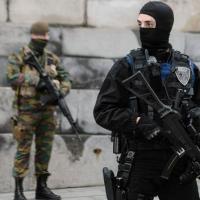
For general assemblies in all workplaces
The Belgian government quickly realized that after the terrible attacks in Paris French President Hollande passed the blame to ‘Belgium’. Belgium was called the “weak link” in the fight against terror. We soon felt the effect of it. The terror threat in the whole country was put at ‘level 3’, which translates in a threat which is "serious, possible and probable". In Brussels the threat is at level 4 which means "imminent" or “very nearby” (it was reduced to level three from Friday 27 November). Security deserves our priority. We can not allow our lives to be threatened by rampaging religious fundamentalists or other conservative forces. But is that really what the Belgian government aims to do?
In Brussels, the metro shut down for almost a full week. Subway stations were closed. Schools and universities were closed. All shops in the main shopping street were closed. Heavily armed police and soldiers took to the streets and armored vehicles were positioned at key locations in the city. The threat was that suspect Abdeslam, who’s still on the run, would detonate a belt bomb at one of these crowded places. But if the metro was closed, why then not the railway axis North-South that goes underground for miles in the centre of Brussels, as the railway workers union suggested. Why? If the risk was so high, why were the tram and bus drivers expected to be running those risks? Understandably bus drivers from Ninove and Dilbeek refused to drive their bus into the capital.
Could it be that the government was less concerned with our security and more occupied with polishing its image? Even in Paris the subway remained active. No journalist – and there are many in Brussels – could recall any similar measures been taken anywhere. The capital, and within it the impoverished Molenbeek area, recently rebaptised the "hub for Islamic terrorism", was until recently, before the attack on the Jewish Museum in 2014, never the scene of a terrorist attack, unlike many other cities worldwide. Could it be that some have taken this opportunity to test out how far they could go with the army and police to sideline democratic institutions?
If we consider how this government deals with our wages, our benefits and our job security, we should have no confidence to entrust them with our security and that of our parents, children and grandchildren. If it depends on the federal and regional governments, these terrorist threats will primarily serve as an opportunity to break down democratic rights. The Walloon transport minister, Di Antonio, from the Christian Democrats (CDH), called the regional strike in Hainaut on 23 November "inappropriate" in these times of terror and threatened to reconsidser the state’s subsidies to the public transport company TEC. For the Flemish nationalists who lead the government (N-VA), it is all the fault of the "Islamo-socialists". The Francophone Liberal member of parliament (MR) Knaepen wants to ban the "Islamic veil" in public. If government and politicians now call for "national unity" it is to cover up their own failures and use a smokescreen of racism, stigmatization of deprived neighborhoods and suspicion of refugees, to divide working people and their families, in order to weaken them.
If the labor movement does not respond, we can expect a tsunami of reactionary ideas and actions. Many workers are worried. While they are at work and their children are at school, they fear, a terrorist equipped with bombs could be wandering the streets with the intention to commit a deadly attack.Belgium has not experience the level of terrorist attacks as some other parts of Europe, like Turkey. However we cannot let the right-wing government and politicians dominate events and the political agenda.
The union leaders decided to temporarily called off large public activities. But that must not mean inaction. The focus should be on action on the shopfloor. Security in and around the workplace falls within our core activities [through Works Councils, for example] and these issues should not be left to the bosses and their political lackeys.
Militant union shop stewards should not remain paralysed, but must use the political context to demand workplace meetings. Workers have to be able to express their concerns so that the unions can develop proposals to ensure the safety for everyone, if necessary by a temporary work stoppage, but without falling into racial prejudice. As we fight in the workplace against racist and reactionary ideas with our collective action, so too must we fight the influence of religious fundamentalists in the impoverished neighborhoods. That is a task for those who live in those neighborhoods but can only be achieved if the whole labor movement takes up this responsibility.


Be the first to comment